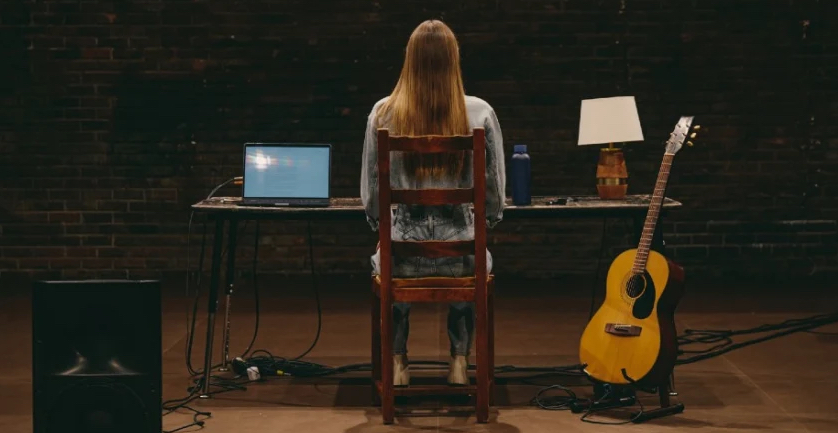I LOVE YOU SO MUCH I COULD DIE
Written and Performed by Mona Pirnot
Directed by Lucas Hnath
New York Theatre Workshop
Reviewed by David Spencer
Theatrical experimentation is a good thing, especially when it leads to breakthroughs in nuts-and-bolts technique or augments theatrical vocabulary or shifts the paradigms of perception via staging new material or re-imagining old. And of course it comes with its inherent risks, but without those, it’s not an experiment.
But I’m less a proponent of experimentation that’s only an exercise in innate pretension, or that purports to present us with something very new that’s really something very old. Not that the two are mutually exclusive, but as I think I Love You So Much I Could Die is a good-faith effort coming from an honest place, I’ll cite it as one of the latter.
It’s performed, just barely, by playwright Mona Pirnot, who makes her entrance walking up the left side aisle of the house, such that you’d only ever see her face if you were well=-positioned and really paying attention as she strode past you; and takes her seat at a small desk, center stage. On it, to her left, is a slim laptop, likely a Macbook, cabled to a large acoustic speaker that faces us. To her right is a guitar on a stand. There’s a mic on an adjustable desk stand, angled to practically caress her mouth. There’s also a thermos; probably water.
She activates playback and we hear, in a reasonably expressive, male voice, generated electronically via artificial intelligence, the text of the autobiographical story she wishes to tell. A painful story about loss, it doesn’t quite describe the loss itself, but concentrates on her reaction to it and how she tried to cope with it. Periodically she stops playback to lift the guitar and sing a folksy song of her own authorship as commentary. Then she replaces the guitar on the stand and reactivates playback. When it’s all over, she exits through an upstage door. We never see her face until she returns for her bow.
How effective is the narrative? Your mileage may vary. I found it lulling; my companion stayed right with it. The songs? Simple and dull. No revelations; intended as respites to the drone of the voice, perhaps. As to the rest?
Though direction—which I have to assume is mild, mostly concerned with appearance, minimal lighting effects and perhaps modulation of the AI voice—is credited to Me. Pirnot’s husband, playwright Lucas Hnath (pronounced Nayth)—it’s almost as if we’ve been listening to an audiobook with a live person standing (or sitting) in for the jewel case cover graphic. And what does that audio-centric approach accomplished? Does the underlying rationale have something to do with the experience being communal? Noted. And then what?
Is the piece an essay on disconnectedness to one’s past except via artificial means? Krapp’s Last Tape by Samuel Beckett.
Is it about the seduction of narrative that tells you everything except the defining particulars at the center? Almost anything by Harold Pinter.
Is it about alienation? Bertolt Brecht.
Is it about trauma so well-negotiated that naming it upsets the delicate balance? You know that one.
And countless counterculture experiments off and off-off Broadway from the ‘50s onward, ubiquitous enough to be filtered through now-familiar satire.
I just think that with so many worthy playwrights, established and new, struggling for their work to get seen and heard, work that—succeed or fail—strives at least to engage the mind and senses in a manner worth leaving the house for, risking another dose of COVID for, the collateral expenses and schedule-juggling real-life obligations…will all those other dramatists on tap…a little more non-impressionistic, real-life consideration is worthwhile before determining that a woman with her back to the audience, singing saddish songs between triggering long passages read by an electronic voice is truly the sine qua non you just need to share with your patrons. And if you decide it is: well, okay. But that’s the context the times demand.
And of course not everything is for everybody.
And of course some things will bewilder and frustrate anyway, even as they have their proponents.
And I Love You So Much I Could Die has them.
But still…but still…but still…
